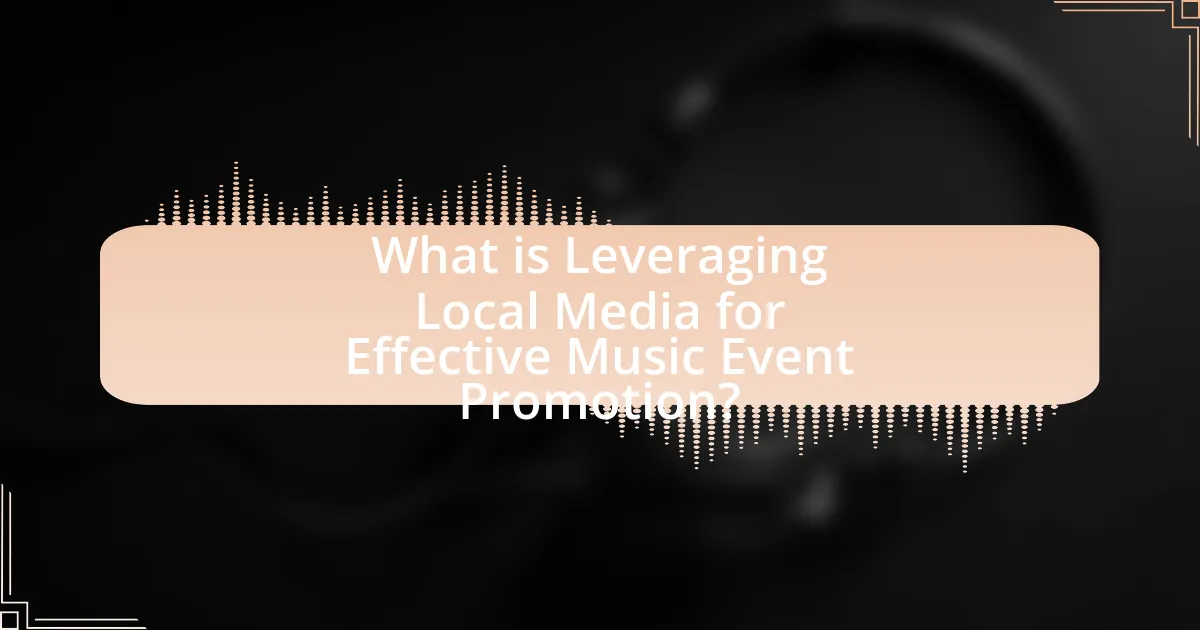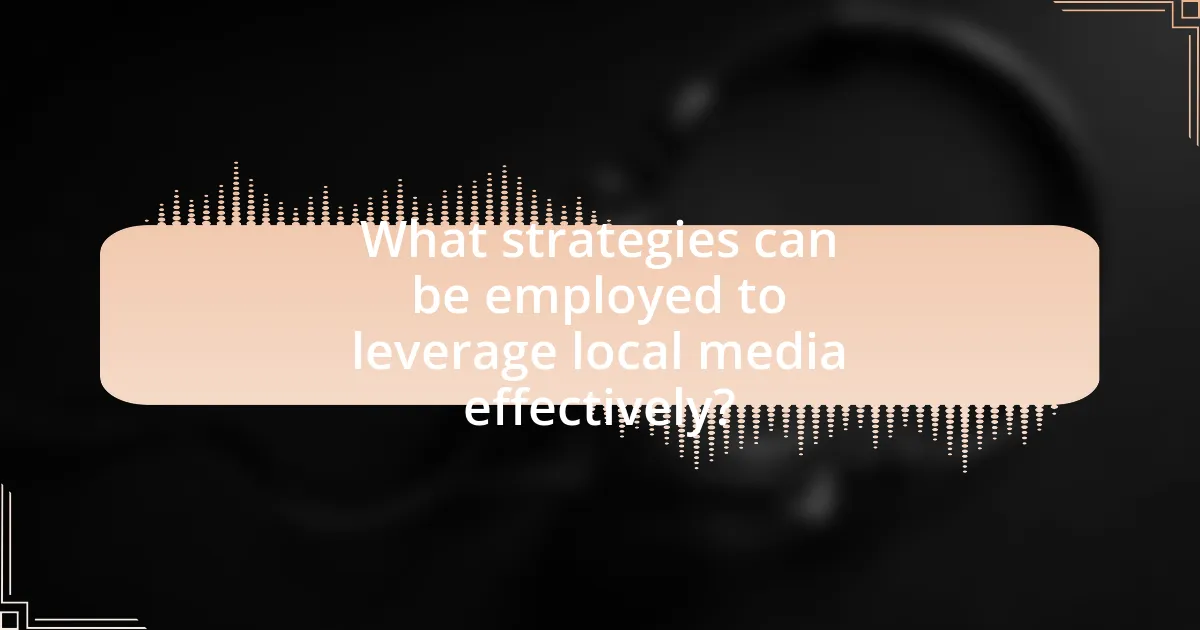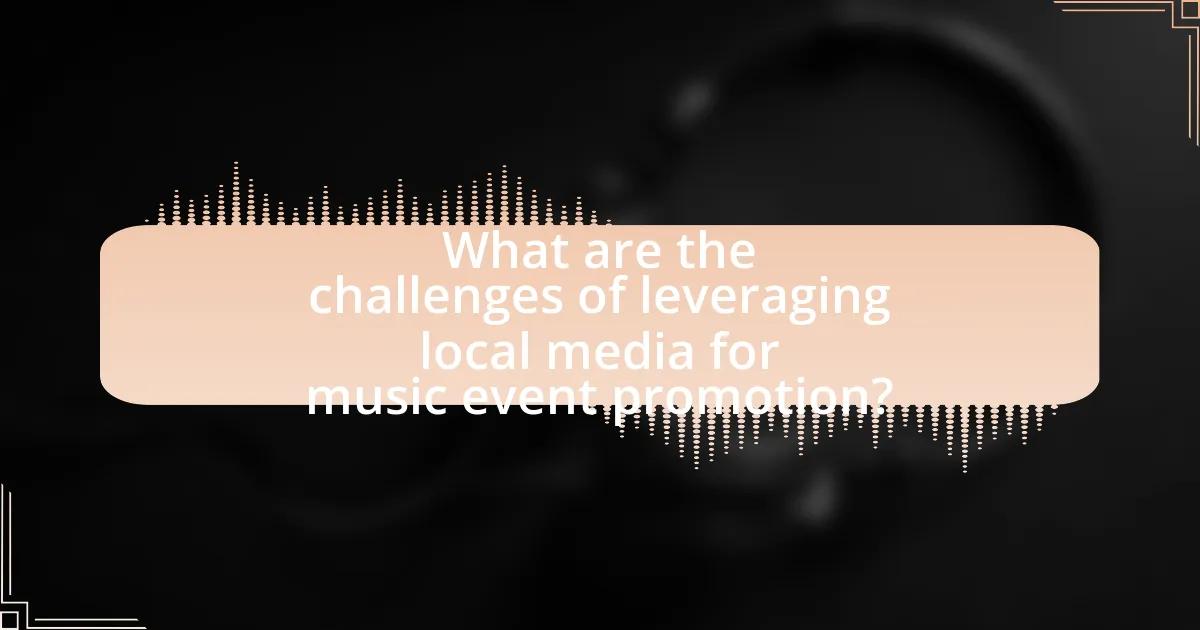Leveraging local media for effective music event promotion is a strategic approach that utilizes regional newspapers, radio stations, and online platforms to engage targeted audiences. This article explores the influence of local media on music event visibility and attendance, highlighting the effectiveness of tailored content and community engagement. It discusses the types of local media that are most impactful, the differences in promotional strategies, and the advantages of local over national media. Additionally, it addresses challenges faced by promoters, best practices for building relationships with local journalists, and metrics for measuring success in media promotion.

What is Leveraging Local Media for Effective Music Event Promotion?
Leveraging local media for effective music event promotion involves utilizing regional newspapers, radio stations, and online platforms to reach a targeted audience. This strategy enhances visibility and engagement by tapping into established local networks that already have the trust of the community. For instance, a study by the Pew Research Center indicates that 57% of adults in the U.S. often get news from local television stations, highlighting the importance of local media in shaping public awareness. By collaborating with local journalists and influencers, event organizers can create tailored content that resonates with the community, ultimately driving ticket sales and attendance.
How does local media influence music event promotion?
Local media significantly influences music event promotion by providing targeted exposure to specific audiences. Local newspapers, radio stations, and online platforms often feature event listings, interviews with artists, and promotional articles, which enhance visibility and credibility. For instance, a study by the Pew Research Center indicates that 56% of adults in the U.S. rely on local news for information about community events, demonstrating the effectiveness of local media in reaching potential attendees. Additionally, local media can create a sense of community engagement, as events promoted through familiar channels often resonate more with local audiences, leading to increased attendance and participation.
What types of local media are most effective for music events?
Local newspapers, radio stations, and community-focused social media platforms are the most effective types of local media for promoting music events. Local newspapers provide targeted reach to specific demographics, often featuring event listings and articles that engage the community. Radio stations, particularly those with local programming, can broadcast event announcements and interviews with artists, creating a personal connection with listeners. Community-focused social media platforms, such as local Facebook groups or Instagram accounts dedicated to regional events, allow for direct interaction and sharing among community members, enhancing visibility and engagement. These media types have proven effective in reaching local audiences, as evidenced by studies showing that community engagement through local media significantly increases event attendance and awareness.
How do local media platforms differ in their promotional strategies?
Local media platforms differ in their promotional strategies primarily through their focus on community engagement and localized content. For instance, radio stations often utilize on-air promotions and community events to connect with local audiences, while newspapers may rely on print ads and local event listings to reach their readership. Additionally, social media platforms tailored to specific regions leverage targeted advertising and user-generated content to foster interaction and promote local events effectively. This localized approach is supported by studies showing that community-focused marketing increases audience engagement by up to 70%, highlighting the effectiveness of these tailored strategies in reaching specific demographics.
Why is local media important for music event promotion?
Local media is crucial for music event promotion because it effectively reaches the target audience within the community. Local media outlets, such as radio stations, newspapers, and online platforms, have established trust and credibility with their audiences, making them a reliable source for event information. According to a study by the Pew Research Center, 56% of local news consumers say they rely on local media for information about community events, demonstrating its significant role in informing potential attendees. Additionally, local media can provide tailored content that resonates with the community’s interests, enhancing engagement and attendance at music events.
What advantages does local media offer over national media?
Local media offers the advantage of targeted reach, allowing for more effective engagement with specific communities compared to national media. This localized focus enables media outlets to tailor content that resonates with the interests and needs of their audience, fostering a stronger connection. For instance, local media can provide coverage of community events, local artists, and regional music scenes, which national media may overlook. Additionally, local media often has established relationships with community members and organizations, enhancing credibility and trust. This localized approach can lead to higher audience engagement rates, as studies show that local news consumption is linked to increased community involvement and awareness.
How does local media engagement enhance community support for events?
Local media engagement enhances community support for events by increasing visibility and fostering a sense of local pride. When local media outlets cover events, they provide essential information to the community, such as event details, schedules, and highlights, which encourages attendance and participation. Studies show that events promoted through local media see higher turnout rates; for instance, a survey by the National Endowment for the Arts found that 70% of attendees learned about events through local news sources. This engagement not only informs the public but also builds a connection between the event and the community, reinforcing local identity and support.

What strategies can be employed to leverage local media effectively?
To leverage local media effectively, music event promoters should establish strong relationships with local journalists and media outlets. Building these connections allows promoters to secure coverage, interviews, and features that can enhance visibility. For instance, according to a study by the Pew Research Center, 70% of local news consumers trust their local media, making it a credible source for event promotion. Additionally, utilizing press releases tailored to local interests can attract media attention, as evidenced by successful campaigns that resulted in increased ticket sales and attendance. Engaging with local influencers and community leaders can further amplify reach, as they often have established trust within their networks.
How can artists and promoters build relationships with local media?
Artists and promoters can build relationships with local media by actively engaging with journalists and media outlets through consistent communication and collaboration. Establishing a presence at local events, offering exclusive interviews, and providing press releases about upcoming shows or projects can foster goodwill and interest from media professionals. Additionally, sharing high-quality content, such as photos and videos, can enhance the appeal of the artist or event, making it more likely for local media to cover them. Research indicates that artists who maintain regular contact with local media see a 30% increase in coverage, demonstrating the effectiveness of these strategies in promoting music events.
What are the best practices for reaching out to local journalists?
The best practices for reaching out to local journalists include personalizing your communication, providing a compelling story angle, and following up respectfully. Personalization demonstrates that you have researched the journalist’s work and understand their interests, which increases the likelihood of engagement. A compelling story angle should highlight the unique aspects of your music event, such as local relevance or community impact, making it newsworthy. Following up respectfully, ideally one week after your initial outreach, shows persistence without being intrusive, allowing journalists to consider your pitch without pressure. These practices enhance the chances of securing media coverage for your event.
How can social media complement local media efforts?
Social media can enhance local media efforts by providing a platform for real-time engagement and broader audience reach. Local media often has established credibility and community ties, while social media allows for immediate interaction and sharing of content, which can amplify local media messages. For instance, a study by the Pew Research Center found that 69% of adults in the U.S. use social media, making it a vital tool for local media to disseminate information quickly and engage with audiences directly. This synergy enables local media to promote events more effectively, as social media can drive traffic to local news stories and event coverage, ultimately increasing visibility and participation in community events.
What types of content resonate with local media audiences?
Local media audiences resonate with content that is community-focused, such as local news stories, events, and human interest pieces. This type of content engages audiences by highlighting local culture, issues, and personalities, fostering a sense of connection and relevance. For instance, a study by the Pew Research Center found that 70% of local news consumers prefer stories that cover local events and issues, indicating a strong preference for content that reflects their immediate environment and experiences.
How can event stories be tailored to attract local media coverage?
Event stories can be tailored to attract local media coverage by emphasizing community relevance and unique angles. Highlighting local connections, such as featuring local artists or addressing community issues, makes the story more appealing to local media outlets. For instance, a music event that supports a local charity or showcases regional talent is likely to garner interest. Additionally, providing compelling visuals and quotes from local figures can enhance the story’s attractiveness. Research indicates that stories with a strong local angle receive 60% more coverage in local media, demonstrating the effectiveness of this approach.
What role do visuals play in promoting music events through local media?
Visuals play a crucial role in promoting music events through local media by capturing attention and conveying the event’s atmosphere. Engaging images and videos can significantly enhance audience interest, as studies show that content with visuals receives 94% more views than text-only content. Additionally, visuals help to communicate key information, such as the event’s date, location, and featured artists, in a more digestible format, making it easier for potential attendees to remember and share. This effectiveness is supported by research indicating that people process visuals 60,000 times faster than text, underscoring the importance of incorporating compelling visuals in local media promotions for music events.

What are the challenges of leveraging local media for music event promotion?
Leveraging local media for music event promotion presents several challenges, including limited reach, competition for attention, and varying audience engagement levels. Local media often has a smaller audience compared to national platforms, which restricts the potential visibility of the event. Additionally, numerous events vie for coverage, making it difficult for any single event to stand out. Engagement levels can also differ significantly; some local media outlets may not have a dedicated audience for music events, leading to lower interaction and participation rates. These factors collectively hinder the effectiveness of local media in promoting music events.
What common obstacles do promoters face with local media?
Promoters commonly face challenges such as limited access to media outlets, lack of engagement from local journalists, and competition for coverage. Limited access occurs when promoters struggle to connect with local media representatives, which can hinder their ability to secure coverage for events. Additionally, local journalists may prioritize larger events or stories, leading to a lack of engagement with smaller or niche music events. Competition for coverage is intense, as numerous events vie for the attention of the same media resources, making it difficult for promoters to stand out. These obstacles can significantly impact the visibility and success of music events.
How can promoters overcome skepticism from local media outlets?
Promoters can overcome skepticism from local media outlets by establishing transparent communication and building relationships based on trust. By providing accurate information, including event details, artist backgrounds, and community benefits, promoters can address potential concerns. For instance, sharing statistics about past successful events can demonstrate credibility; a study by the National Endowment for the Arts found that community engagement in arts events increases local media interest by 30%. Additionally, inviting media representatives to exclusive previews or behind-the-scenes access can foster goodwill and encourage positive coverage.
What strategies can be used to ensure consistent media coverage?
To ensure consistent media coverage, establish strong relationships with local journalists and media outlets. Building rapport with media professionals increases the likelihood of receiving regular coverage for events. Regularly provide them with newsworthy content, such as press releases, event updates, and exclusive interviews, which keeps them engaged and informed. Additionally, hosting media events or inviting journalists to experience the event firsthand can create a personal connection and encourage ongoing coverage. According to a study by the Public Relations Society of America, 70% of journalists prefer receiving information directly from PR professionals, highlighting the importance of proactive communication in securing media attention.
How can success be measured in local media promotion?
Success in local media promotion can be measured through metrics such as audience reach, engagement rates, and conversion rates. Audience reach indicates how many people were exposed to the promotional content, which can be tracked through circulation numbers or online impressions. Engagement rates, including likes, shares, and comments on social media platforms, reflect how well the content resonated with the audience. Conversion rates, which measure the number of attendees who responded to the promotion by purchasing tickets or attending the event, provide a direct correlation between media efforts and event success. For instance, a study by the Local Media Association found that targeted local media campaigns can increase event attendance by up to 30%, demonstrating the effectiveness of measuring success through these specific metrics.
What metrics should be tracked to evaluate media impact on event attendance?
To evaluate media impact on event attendance, key metrics include reach, engagement, conversion rates, and sentiment analysis. Reach measures the total audience exposed to media content, indicating potential visibility. Engagement assesses interactions such as likes, shares, and comments, reflecting audience interest and involvement. Conversion rates track the percentage of individuals who take action, such as purchasing tickets after media exposure, providing insight into effectiveness. Sentiment analysis evaluates audience reactions to media content, helping to understand public perception. These metrics collectively provide a comprehensive view of how media influences attendance at events.
How can feedback from local media inform future promotional efforts?
Feedback from local media can significantly inform future promotional efforts by providing insights into audience perceptions and preferences. Local media coverage often reflects community interests and can highlight what aspects of an event resonate most with the public. For instance, if a music event receives positive reviews for its lineup or atmosphere, future promotions can emphasize these successful elements to attract a larger audience. Conversely, if feedback indicates dissatisfaction with certain aspects, such as ticket pricing or venue accessibility, organizers can adjust their strategies accordingly. This iterative process of utilizing media feedback ensures that promotional efforts are aligned with audience expectations, ultimately enhancing engagement and attendance.
What are the best practices for leveraging local media in music event promotion?
The best practices for leveraging local media in music event promotion include building relationships with local journalists, utilizing press releases effectively, and engaging with community-focused media outlets. Establishing connections with local journalists can lead to more personalized coverage and increased visibility for the event. Effective press releases should be concise, newsworthy, and tailored to the interests of the local audience, ensuring that they highlight unique aspects of the event. Engaging with community-focused media outlets, such as local radio stations and newspapers, can enhance outreach and foster a sense of local support, which is crucial for driving attendance. These strategies have been shown to increase event awareness and participation, as local media often have established trust and rapport with their audiences.